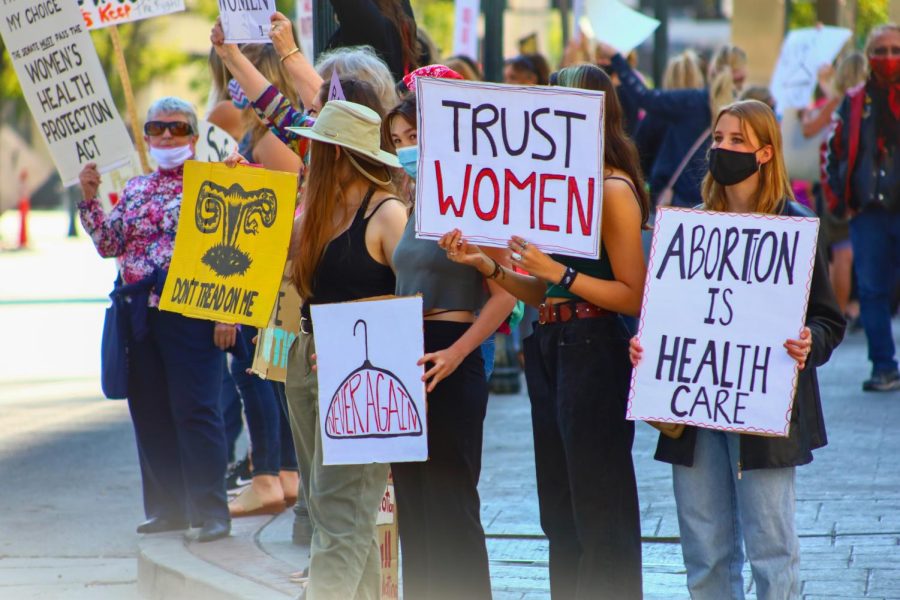The danger of restricting abortions after Roe v. Wade
UNSPLASH PHOTO COURTESY OF Manny Becerra
The recent rumor of Roe V. Wade case being possibly overturned causes woman and society as a whole to fear the dangers this will bring. https://unsplash.com/license
May 20, 2022
A woman’s life is full of taboos: periods, sexual harassment and childbirth. Then there’s birth control, one of the only ways to take control of our bodies.
On May 3, the nation was met with the terrifying news that Roe v. Wade may be overturned after a drafted Supreme Court decision was anonymously leaked to POLITICO, the online news company. The Supreme Court Justices: Chief Justice John Roberts, Clarence Thomas, Stephen Breyer, Samuel Alito, Sonia Sotomayer, Elena Kagen, Neil Gorsuch, Brett Kavanaugh and Amy Coney Barrett, now are juggling with the future of women’s lives.
Justice Samuel Alito is quoted in the draft explaining his thoughts on the monumental ruling.
“We hold that Roe and Casey must be overruled,” he wrote. “It is time to heed the Constitution and return the issue of abortion to the people’s elected representatives.”
By overturning this landmark decision, which federally makes legal and safe abortion a constitutional right, the Supreme Court would place the decison of abortion into the hands of state lawmakers. If overturned, NPR estimates that about 40 million women would risk losing the access to abortion, as more than 20 state lawmakers and legislators would to ban or restrict abortions without exceptions of rape and incest.
This is not only a dangerous decision that puts women’s lives at risk, restricting their rights over their own body but it is a part of the continuous, despicable, notion that women are unable to make their own sound decisions. An idea that is ingrained into America’s long history.
Banning abortions, does not prevent abortions. All it does is stop safe abortions. If the court chooses to overrule Roe v. Wade, millions of women will be in danger of the effects of unsafe back-alley or self-induced abortions.
Before Roe, women had to undergo unsafe abortions because it was illegal, which Rachel Benson Gold of the The Guttmacher Institute, a research organization in New York, explains.
“By 1965, the number of deaths due to illegal abortion had fallen to just under 200, but illegal abortion still accounted for 17% of all deaths attributed to pregnancy and childbirth that year,” Gold wrote. “And these are just the number that were officially reported; the actual number was likely much higher.”
The decision to get an abortion has never been an easy one, but taking away this choice from women and others makes life harder than it already is. It also makes it harder for the child they are being forced to raise, as the parent(s) may not be prepared or have the necessary support.
Additionally, abortions are not only preformed on cisgender straight women. Transgender and non-binary Americans also need the ability to have access to abortions, NPR explains.
“Activists and supporters of the LGBTQ community say any decision to overturn Roe v. Wade could have significant consequences on vulnerable groups if privacy-related rights like access to contraception or gender-affirming care are threatened,” Ayen Bior of NPR wrote.
Even more, men are never held accountable or responsible for the lives they help create. In many cases, rape would have a lesser sentence than an illegal abortion. Women would become felons for an illegal abortion, taking away their ability to vote. By overturning Roe v. Wade, the court highlights that in the government’s eyes, men are still held higher than women.
Renee Bracey Sherman, of We Testify an organization for people who have had abortions, said, “Everyone loves someone who had an abortion.”
We are going backwards as a country. Abortions are an important necessary part of society. Anyone who says otherwise just does not understand the severity of this decision.




